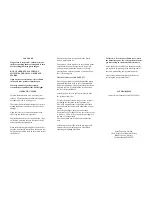
OPERATING & SAFETY GUIDE
PATIO HEATER
LPG
Product Code
16090
GENERAL SAFETY
Contact Event Furniture Limited for information
and advice on the suitability and safety of this type
of equipment.
There is a risk of injury if you do not follow the
instructions printed in this guide.
This equipment should only be used by a
competent adult who has read and understood
these instructions.
Anyone with a temporary or permanent disability
should seek expert advice before using the
equipment.
Keep all children, animals and bystanders away
from the work area. Ensure the floor of the work
area is free from trip hazards and non-slip.
Never use the equipment if you are ill, tired or
under the influence of alcohol or drugs.
Check the equipment before use, if it shows
signs of damage request a replacement.
Never use the heater indoors or in a poorly
ventilated space.
Never carry or pull the heater or gas cylinder by
the supply hose.
Wear suitable clothing and footwear, tie back long
hair. Never set up the heater near surfaces that
might be damaged by heat.
Do not attempt to move the heater while it is lit.
Always turn off the gas at the cylinder, then at the
heater control and allow it to cool.
Always turn off the heater when not in use. Never
leave the heater turned on while unattended.
It is the hirer’s responsibility to ensure all
necessary precautions are taken to safeguard
against the risk of fire and injury.
HEALTH & SAFETY REGULATIONS
The use and storage of LPG cylinders is governed
by specific regulations/legislation. Make sure
you know and understand the regulations that
apply and follow them. If in any doubt, contact
an Event Furniture representative for advice.
GAS SAFETY
Propane is highly inflammable and heavier
than air, this increases the risk of explosion.
Keep gas cylinders upright at all times, do not
drop or knock them. Damaged cylinders can
be dangerous.
Store gas cylinders in a secure, cool area;
away from heat, possible ignition source and
clear of drains or depressions where any
leaked gas may collect.
Do not smoke or permit naked flames in the
area when changing gas cylinders.
Handle gas cylinders and connectors with
care. Carefully check the connections for
leaks (use washing up liquid and look for
bubbles).
NEVER test for leaks with a naked flame.




















